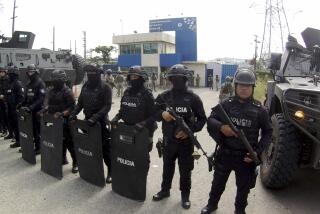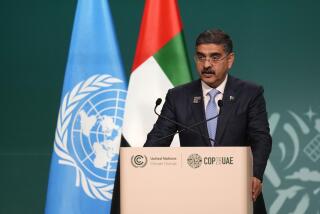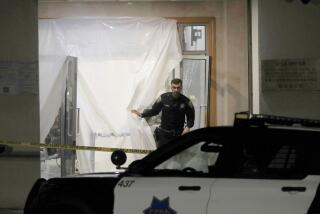$2-Million Offer for Help Finding Karachi Killers : Justice: U.S. ambassador announces reward in manhunt after slaying of two consulate employees. Violence takes 15 more lives in Pakistani city.
- Share via
KARACHI, Pakistan — The American ambassador on Thursday offered a $2-million reward for help bringing the killers of two U.S. government employees to justice, as a team of FBI counterterrorism experts flew here to help hunt down the assassins.
At the U.S. Consulate, where the slain Americans worked, officials ordered beefed-up security.
Diplomats began traveling to and from their homes in convoys and were escorted by paramilitary Rangers and police, employees said. Nonessential personnel were told not to come to the consulate, to stay at home and keep a low profile.
Meanwhile, Karachi’s ugly violence continued, despite the police and paramilitary reinforcements deployed after the Americans’ murders Wednesday.
In the 36 hours that ensued, 15 people were reported slain in this sprawling seaside city, including three people working in an auto parts shop.
The motives for the attack on the Americans remained shrouded in mystery, and the gunmen were still at large.
But a taxi driver was being interrogated and was helping with artist sketches of three young men who stole his vehicle at pistol-point at 6:15 a.m. Wednesday. An hour and a half later, the yellow Suzuki Khyber apparently was used in the attack on the U.S. personnel.
The Citizens-Police Liaison Committee, an influential business group trying to end Karachi’s frenzy of murder and mayhem, stressed the similarities in the ambush of the Americans and a recent rash of violent crime in Pakistan’s largest city.
Their theory is that the Americans’ assailants were hired-guns also responsible for an explosion of brutal homicides, armed invasions of mosques, kidnap-slayings and the murders of people in their homes over the last six weeks.
But the possible involvement of mercenaries immediately posed the question: Who paid them?
One day after the slaying of the Americans, Pakistani and American officials said they still had no proof of who ordered, financed or carried out the attack.
One theory being pursued by American counterterrorism experts is that the attack may have been an act of revenge for the arrest and extradition of Ramzi Ahmed Yousef, a top suspect in the 1993 World Trade Center bombing in New York City.
U.S. prosecutors say Yousef was trained in bomb-making techniques in the Pakistani city of Peshawar and gave a Karachi address when he checked into a guest house in Islamabad, the capital, last month. He was apprehended Feb. 7 and bundled off to the United States for trial.
Someone claiming responsibility for the Karachi ambush called the Associated Press in Manila on Thursday. “We killed the Americans in Karachi. We are the Liberation Army,” the unidentified voice said. The claim could not be authenticated.
The taxi driver, Zulfiqar Ahmed, said he saw similarities between the men who grabbed his car and sketches of suspects sought in February attacks on two Sunni Muslim families, in which seven men were slain in their home as their horrified families looked on, and the Feb. 25 armed invasion of a Shiite mosque in which 14 people were gunned down.
The possible involvement in both attacks of one of the four mustachioed men, ages 23 to 30--whose sketches were published in Pakistani newspapers Thursday--indicated that the killings might not have had sectarian grounds. That lent credence to the theory of the Citizens-Police Liaison Committee.
*
“These people are all available for a price,” said Nazim Haji, the group’s co-chairman.
On this Arabian Sea port city’s busiest avenue, Jackie Van Landingham, 33, a secretary from Camden, S.C., and Gary C. Durell, 45, a communications technician from Alliance, Ohio, were killed as the Toyota van bringing them to work was sprayed with bullets by at least two men armed with AK-47 assault rifles.
A third American, Mark McCloy, 31, of Framingham, Mass., who worked in the consulate’s mail room, was in stable condition with a gunshot wound to the foot and facial scratches, said Dr. Fazle Rahim at Agha Khan Hospital.
The taxi was later found abandoned about a mile from the ambush site.
U.S. Ambassador John C. Monjo on Thursday expressed “shock and outrage over this act of terrorism.”
In a statement, Monjo said the U.S. government was ready to pay as much as $2 million for information leading to the arrest of those responsible.
The United States also had offered $2 million for information leading to Yousef’s arrest.
*
Some Pakistani officials and politicians have suggested that Prime Minister Benazir Bhutto’s government, and not U.S. interests, may have been the ultimate target in Wednesday’s attack.
The ability of police to contain the spreading violence was thrown in doubt by one officer’s reported behavior immediately after the attack on the Americans.
According to traffic police, Subinspector Raja Ghaus saw the taxi carrying the gunmen who attacked the U.S. Consulate van but refused to follow it and did not radio his headquarters to report the attack.
He only made his report later after driving to the station. He was suspended Wednesday night and arrested Thursday on charges of negligence.
The roiling unrest in this city of more than 10 million people, in which more than 480 people have perished since December, could prove highly dangerous for Bhutto. On Wednesday, her chief opponent, Muslim League leader Nawaz Sharif, met for 2 1/2 hours with the powerful army chief of staff, Gen. Abdul Waheed.
Pakistani press reports said Sharif told Waheed that Bhutto’s Pakistan People’s Party government, which took power in October, 1993, had committed error after error and had no right to continue in office.
The meeting in Islamabad was fraught with implications, since Waheed’s opposition was one of the reasons Sharif was removed from office in 1993, ultimately paving the way for Bhutto’s return to power.
Times special correspondent Jennifer Griffin in Islamabad contributed to this report.
More to Read
Sign up for Essential California
The most important California stories and recommendations in your inbox every morning.
You may occasionally receive promotional content from the Los Angeles Times.










